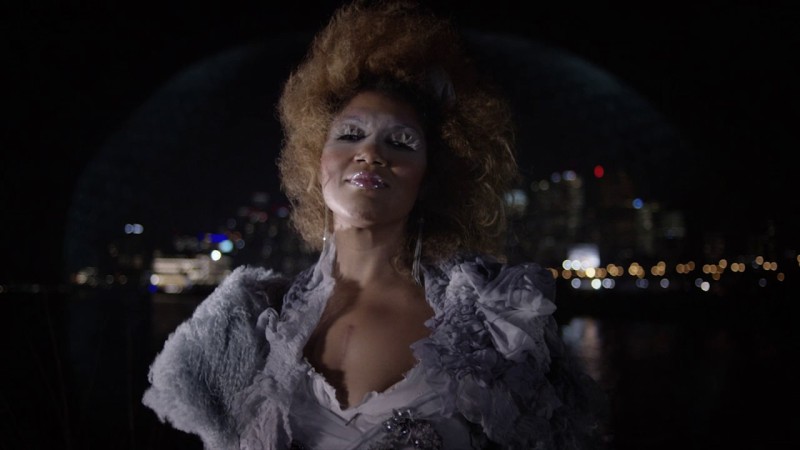By Sabrina Furminger

Measha Brueggergosman in Brown Girl Begins (2017), directed by Sharon Lewis
Shortly after Barbara Chirinos launched VIFF’s Black History Month film series in 2012, she observed an interaction between a mother and daughter that exemplified why the series was important in the first place.
The interaction took place in the lobby of the Vancity Theatre after a screening of The Godmother of Rock & Roll: Sister Rosetta Tharpe, a thrilling rock documentary about the Black woman whose mastery of the electric guitar in the ‘40s, ‘50s, and ‘60s influenced everyone from The Beatles to Eric Clapton to the Rolling Stones. Chirinos watched as an energized 11-year-old girl “turned to her mother and said, ‘I’ve always wanted to play a guitar but I’ve never seen someone who looked like me playing an electric guitar, and now I know it’s okay,’ and that solidified it for me,” Chirinos recalls in a recent phone interview. “This is exactly why I’m doing this series.”

Chirinos spoke with us about this year’s Black History Month film series and the contribution it makes to Vancouver’s cultural diversity.
Q: What thread connects the films in this year’s Black History Month series? BARBARA: The thread that runs through this year’s programming involves warriors present, past, and future. The series opens with Whose Streets, which takes us to Ferguson, Missouri to see what that community went through from their point of view. That’s the present. And then the film Anita, about Anita Hill, who was telling all of us about the sexual harassment she had gone through at the hands of a now Supreme Court justice in the United States: that’s the past. Although she was a legal scholar and professor at a university telling her truth, people didn’t believe her, which is outrageous. She’s a foremother of the #MeToo movement. Unfortunately, it took over 20 years for us to get to the place where we can speak our truth and people believe us. Then we see the future in Brown Girl Begins, which is afrofuturism. I’m always looking for Canadian content, and with this film I felt as if I hit the trifecta: it’s based on the novel Brown Girl in the Ring by Nalo Hopkinson, a Jamaican-Canadian author; it’s science fiction; and the story takes place in Toronto. And opera diva Measha Brueggergosman is in the film playing an Afro-Caribbean deity!
Anita (2013), directed by Freida Lee Mock
Q: What’s a “hidden gem” in the series that you’re especially excited for audiences to see?
BARBARA: There is the film To Sleep with Anger by Charles Burnett. When the studio released it back in 1990, they marketed it incorrectly. It deals a little bit with faith and spirituality, and the marketing division of the distribution company thought it was a horror film, so that’s how they marketed it. When people went to see this film, they were completely disappointed because they were looking for horror, and this film is not horror, and people who would have been interested in a poetic film about a middle-class Black family living in Los Angeles didn’t know the film was for them, and so they didn’t see it, and the film was considered a flop. But this story is so well told, and Charles Burnett has just been recognized by the Academy of Arts and Sciences for all of his wonderful films. There’s now a beautiful 4K restoration of this film, so I thought it was time to bring it in.
Q: Who is the intended audience for the Black History Month film series?
BARBARA: It brings out a lot of people that are of African descent: they’re from the Caribbean, they’re from the United States, they’re from Europe, they’re from all over Africa, they’re from South America, Central America, and they find the film series and they come. But what’s great is that the audience is made up of everybody: People who are interested in documentaries, and people who are interested in stories that are different from what they’re used to seeing all of the time.
Q: What role do you think art in general, and film in particular, should play in this particular moment in history?
BARBARA: It starts conversations. It starts questions. It starts inspiration, and it also starts imagination. Art can fill so many gaps for us, and start a journey or expand a journey, and it’s something that I’m dedicated to being a part of for the rest of my life.
Whose Streets (2017), directed by Sabaah Folayan, Damon Davis
Black History Month takes place at VIFF Vancity Theatre February 5-26. For detailed film descriptions, schedule, and tickets visit http://goviff.org/blackhistorymonth2018
*This interview has been edited and condensed for clarity.
